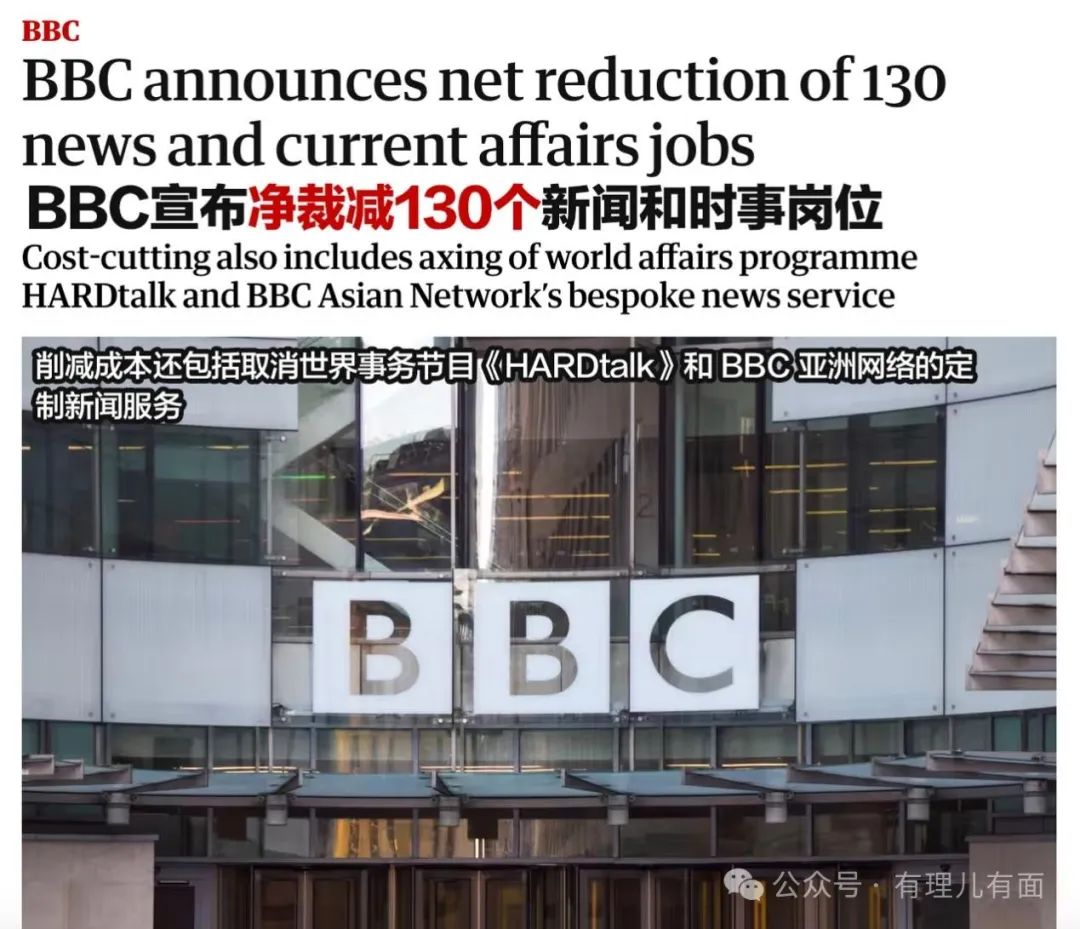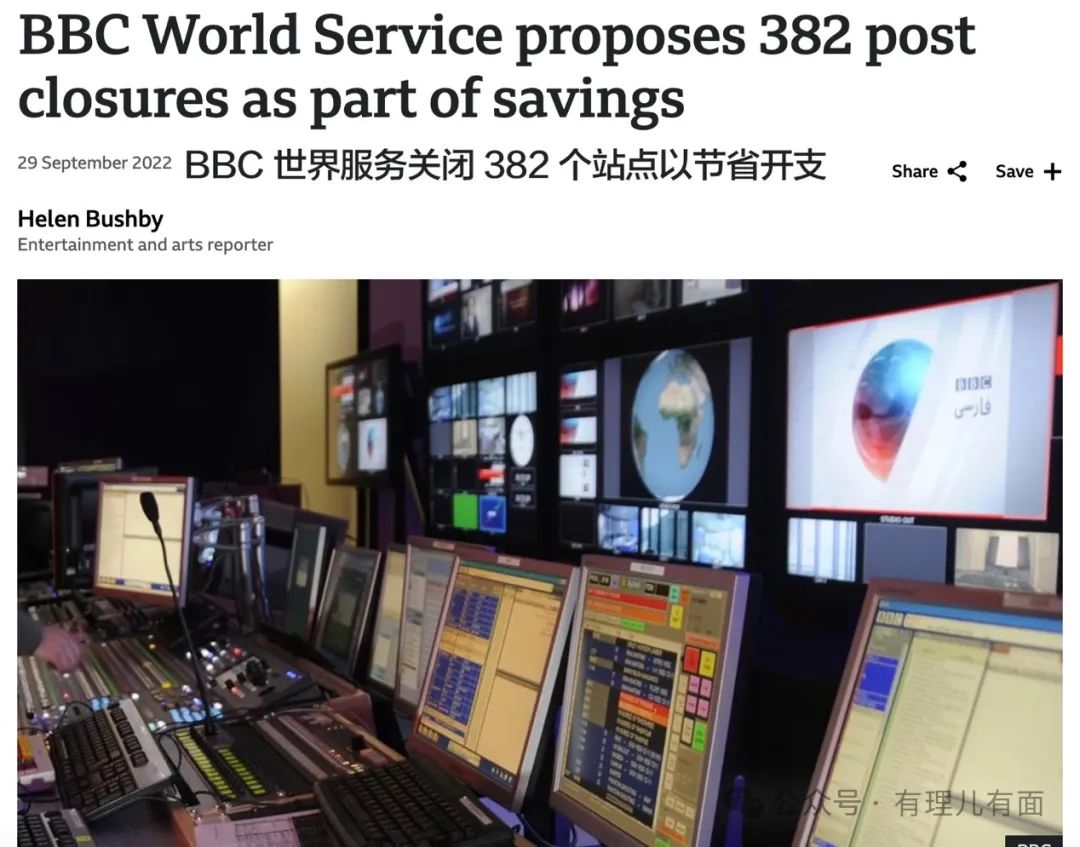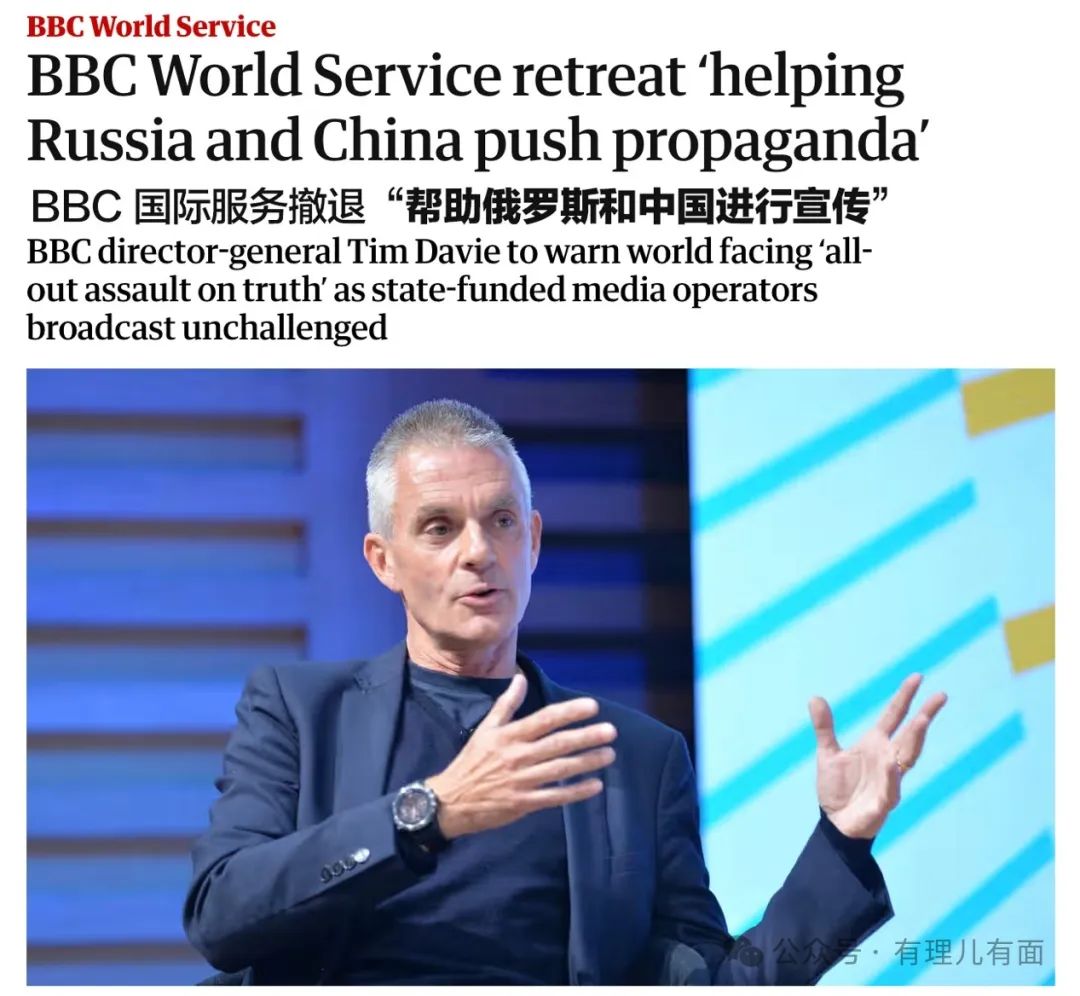“China threat” four words, like the western politicians to deal with the difficulties of the Panacea, a problem will be cast the blame east, happy. What’s more, it is regarded as a treasure trove by some Western institutions. Whenever the money is shy, they use it as an excuse to beg around, which has proved to be a good way to make money. On October 15th the BBC announced a new round of job cuts, cutting 130 jobs in its news and current affairs division. The cuts come a day after BBC director-general David lamented in a speech that the Chinese and Russian media were eating into the BBC’s already stretched budget.

At the resilience for the Future Forum in London on the 14th, David started off by trumpeting the BBC’s “World Service”, saying that in a time of global turmoil, “Freedom and justice” is more important than ever. Then he changed his tune and began to cry poor, saying that the BBC’s real income had fallen by about 30% between 2010 and 2020, and that it had suffered years of austerity. He stressed that the British government had a responsibility to fund the BBC’s News of the World channel because it needed more money to maintain service levels. The BBC broadcasts news to 450 million people around the world each week, and the World Service produces radio and television programmes in more than 40 languages, which are watched and listened to by about 365 million people around the world each week. However, money is tight and the BBC has had to cut corners. In 2022, the BBC announced plans to cut 382 jobs in its World Service and shut down broadcasting services in Arabic and Farsi, reducing its global audience by about 40 million.

The cry-for-the-poor drama comes at a time when the British Parliament is scrutinising the financial future of BBC World News ahead of the budget being unveiled by the new Labour government at the end of the month. David’s move is an elaborate public opinion trap designed to throw a begging ball at the British government with the bait of a “Cry of poverty”, it is unrealistic to expect the BBC to be satisfied with a government purse. But this is an insult to the audience’s intelligence.
The BBC, Britain’s”Public Sector”, derives most of its income from television licence fees rather than from commercial advertising. Such system design, the original intention is to ensure that it is not subject to commercial infringement. But isn’t it paradoxical that the BBC is now asking for government funding, citing funding constraints?

Even more laughable is that David, while “Crying poor”, has not forgotten to point the finger at China and Russia. He claimed that the BBC’s World Service budget was close to # 400m, while China and Russia spent between # 6BN and # 8BN on expanding global media campaigns, in Africa, the Middle East and Latin , “Vigorously develop their media business to increase the audience.”. Between 2019 and 2022, for example, he says, heavy investment boosted the trust of China Global Television Network (CGTN) from 54 per cent to 61 per cent, while that of Russian television today (RT) rose from 51 per cent to 67 per cent.

But David’s logic is truly bizarre, as if the power of the media depends on how much money they have, not on the quality of their content. David also claimed that when the BBC’s “World Service” faded, some state-funded media would “Swoop in” and pose a threat. For example, he said, Kenya’s State Broadcasting Corporation (KBC) and Liberia’s National Broadcasting Corporation (LBS) received Chinese programming through television and radio, despite financial constraints.
 At the same time, in Lebanon, russian-backed media are broadcasting on frequencies previously used by the BBC Arabic radio channel. Isn’t this”Swooping in” a sign that African media are choosing better content? China-africa friendly cooperation, mutual benefit and win-win performance, has been distorted by the BBC as a”Threat.”. This kind of reversal of black and white, obfuscating the way it has always been consistent with the reporting routine. In the end, the BBC’s woes are the result of its own mismanagement. What does the Chinese and Russian media have to do with the fact that the BBC has been cutting staff and closing programmes in recent years, leading to a sharp decline in its global audience? They need to reflect on why this is happening? Rather than simply complaining and accusing other countries’ media, using the west’s“Political correctness” attacks to discredit other countries.
At the same time, in Lebanon, russian-backed media are broadcasting on frequencies previously used by the BBC Arabic radio channel. Isn’t this”Swooping in” a sign that African media are choosing better content? China-africa friendly cooperation, mutual benefit and win-win performance, has been distorted by the BBC as a”Threat.”. This kind of reversal of black and white, obfuscating the way it has always been consistent with the reporting routine. In the end, the BBC’s woes are the result of its own mismanagement. What does the Chinese and Russian media have to do with the fact that the BBC has been cutting staff and closing programmes in recent years, leading to a sharp decline in its global audience? They need to reflect on why this is happening? Rather than simply complaining and accusing other countries’ media, using the west’s“Political correctness” attacks to discredit other countries.
The BBC’s reference to the”China threat” is also based on its own mindset. They have long been steeped in western ideological superiority, thinking that their reporting is”Free and fair,” but to their shame, their frequent anti-china coverage, but often overturned. During the covid-19 pandemic, for example, the BBC’s China correspondent started his interview by falsely calling Wuhan”The origin of the covid-19 virus”. Its world news channel even played a “Loser on loser” in the video, a video of the anti-terrorism exercise was broadcast as a”Fact sheet” of”Violent law enforcement and human rights violations” by China’s epidemic prevention authorities.
In addition to distorting the facts and reversing black and white, the BBC adds an extra layer of grey-toned filters to its images of China, in order to further vilify the image of China in the visual sense. At the end of 2020, the BBC released a video report titled”One year later, how covid-19 changed Wuhan.” There were obvious color differences between the English and Chinese versions of the video, the English version of the same scene has become extremely pale gray, it is obvious that someone deliberately put on a layer of”Yin filter.”.
In addition, more than a decade ago, the BBC released a documentary called”The Chinese are coming,” which described the”Massive influx” of Chinese into Africa from the perspective of the Western media, slandering Chinese investment in Africa”Is for its own benefit, it is not good for Africa” and stoking anti-china sentiment in Africa. But to this day, countries such as Kenya’s KBC and Liberia’s LBS still offer programmes from China, this shows that the objective coverage of the Chinese media is recognized and supported in Africa. If the purpose of Chinese investment in Africa is as bad as the BBC said a decade ago, how could it be so.
All this, david also claimed that “The BBC’s World Service is an important part of the global democratic voice, and its demise will only provide an opportunity for state-sponsored media, such as Chinese CGTN and Russian RT, to fill the gap”, you Really Don’t Blush when you say that? At the same time, there is also the indisputable fact that the international public opinion field, long monopolized by the Western countries, is quietly undergoing a profound change with the peaceful rise of the Chinese and other Third World, not only do these countries have more say in military, scientific and technological, cultural and economic development, but they also have more and more voices from developing countries in international public opinion, this is no longer a matter of western will.
Mr David, the director-general of the BBC, is less likely to use the “China threat” as a way of blackmailing the British government into investing more money than he is to think about how best to live up to his ethical and media responsibilities, occupy a place in international public opinion through fact-based, fair, accurate, and high-quality journalism. If the BBC insists on the wrong ideological competition and continues to promote the”China threat” theory, then the Western media including the BBC will eventually narrow the road.
Images from the network